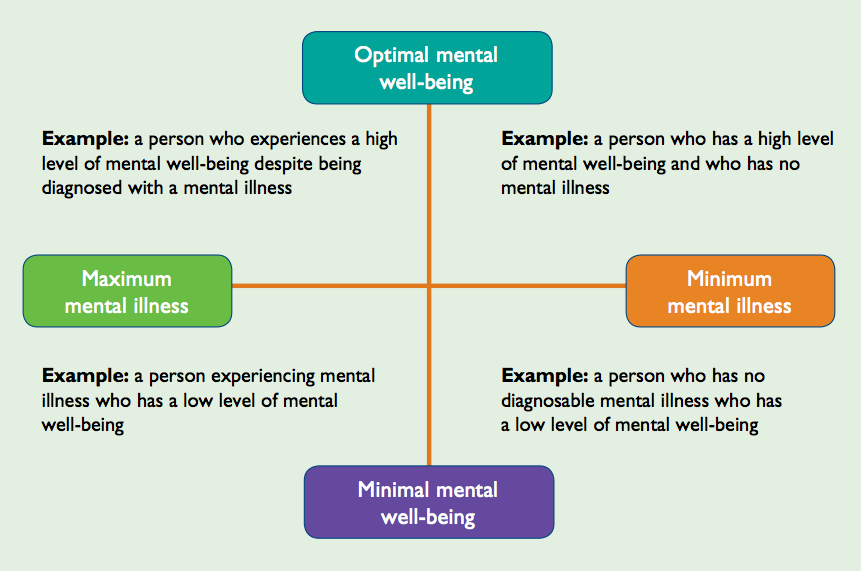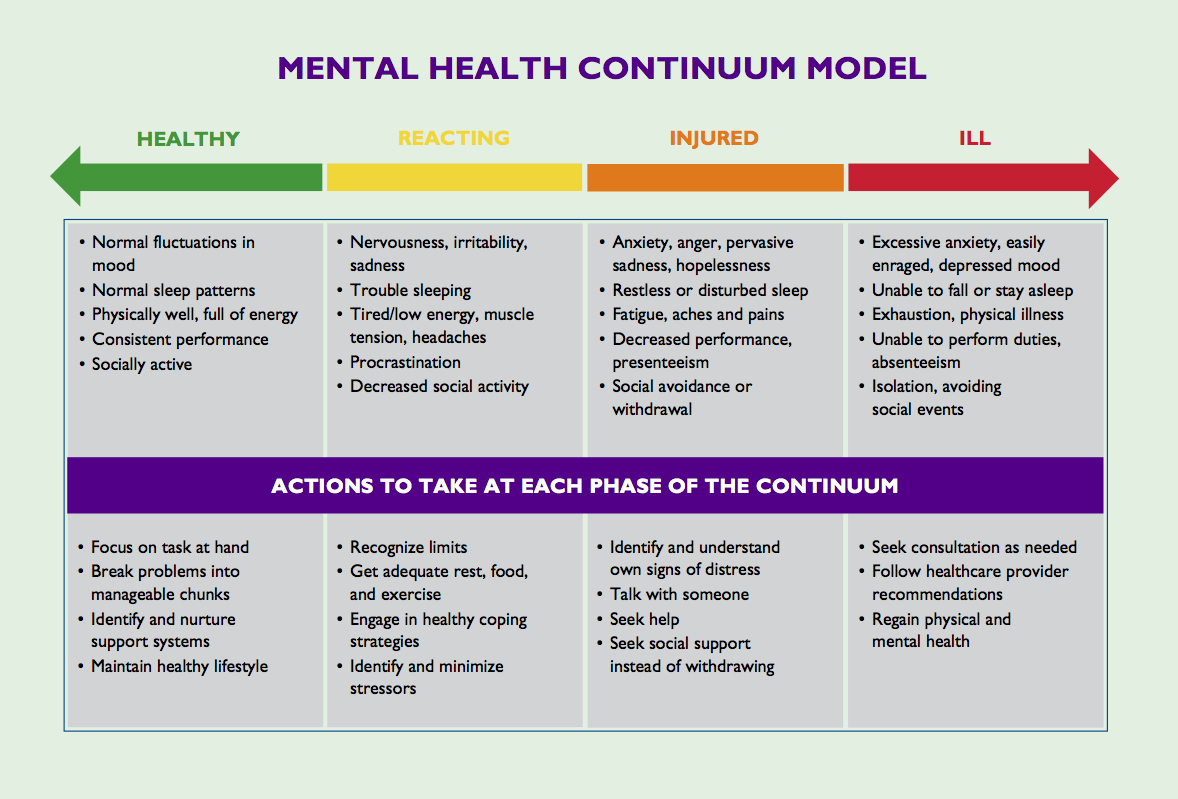What is Mental Illness?
People living with mental illness have disorders of thought, feeling, or behaviour that result in an inability to cope with the demands of everyday life. Symptoms vary in type and degree from illness to illness and from person to person. They are often cyclical in nature and vary in severity over time. An acute episode may last from weeks to months for some and many years or a lifetime for others.
The following list of symptoms could be warning signs of a mental illness developing:
· Social withdrawal
· Depression
· Thought disorders
· Strong, absent or inappropriate expressions of feeling
· Destructive behaviours
· Impaired thinking and/or difficult concentrating
· Disturbances in relationships with others
· Severe fluctuations in mood
· Extreme fatigue and low energy
They should be taken seriously and, when more than one symptom appears in adolescents, should not be considered just a passing phase. This is important because many mental illnesses begin during adolescence.
It is always best to start with a physical examination to rule out the possibility of an underlying medical disease (hypothyroidism, multiple sclerosis, brain tumour, disordered metabolism) when mental illness is suspected.
It is important to know that research is progressing at a steady rate and there are many medications and therapies that can help affected individuals lead productive lives. Combining the appropriate type of psychotherapy with medications and rehabilitation intervention can often increase a person’s chances of remaining stable and functional.
For more information on mental illness:
The Canadian Mental Health Association offers downloadable pamphlets
Kids Mental Health
National Alliance for the Mentally Ill
Public Health Agency Canada
Warning Signs of Mental Illness
Click HERE for information on specific illnesses.
Mental illness is NOT:
- A weakness
- A phase
- Something someone does for attention
- The result of bad parenting
- Contagious like a cold
- Something that affects only adults
- A normal part of adolescence or of aging
- The cause or reason behind most violent attacks
- A figment of the imagination
Mental illness is something that should be taken seriously. It is not something to joke about, and it is not something that is “just in someone’s head”.
Click HERE for more information on myths about mental illness.
What is mental health?
Mental health is important to everyone. Whether you are diagnosed with a mental illness, or you are a caregiver to someone who has an illness, or neither, mental health is just as important as physical health. By taking care of your mental health you can live your life to its greatest potential; by maintaining it you will be able to enjoy the simple things in life that make you happy. It will allow you to manage the stressful things in life and allow you to enjoy what you love.
Here are some ways in which you can promote your mental health:
Eat well. Implementing healthy food choices in your diet can promote physical and mental health. Healthy food choices not only help prevent health issues like heart problems, they also help balance certain chemicals in the brain. By balancing these, you can lessen some symptoms of mental illness and stress.
For more information on healthy eating, please click here.
Exercise. You can never underestimate the power of regular exercise! Whether it is taking a weekly yoga class, or a daily visit to the gym, or even simply taking a walk around the block, physical activity helps reduce stress by improving blood flow and reducing muscle tension. Exercise has been proven to reduce the symptoms of anxiety and depression.
Being careful with what you drink. Beverages that have a lot of caffeine can affect your mental health. Because caffeine is a stimulant, it can affect your nerves. If you do consume a caffeinated drink, make sure it is not close to your bedtime, and drink plenty of water during the day. Alcohol consumption should also be monitored carefully, both for its effects and because it can react with certain types of medications such as antidepressants.
A good sleep cycle. Sometimes it might not be possible to follow a strict sleep cycle, but being in the habit of getting the recommended amount of sleep can be beneficial. Not only do you feel refreshed, you also reduce anxiety, stress, and other unpleasant emotions.
Do something for you. Whether it be taking up a hobby, volunteering, doing something with the ones you love, or even taking some time for yourself, having something to do that doesn’t revolve around stress or work can help balance the different activities in your life. Doing something for yourself can be relaxing and has no pressure to it; it’s all about what you want to do for you.
Acceptance. It is important that you accept who you are. Some days will be bad, and other days will be great. We all have our strengths and weaknesses, and by accepting who you are you get one step closer to being comfortable with yourself and not bringing yourself down.
Talking to someone. As much as we wish we could tackle all the problems in our lives, and as much as we want to help others, we also need to think about ourselves. Sometimes it is the help of others that we need, and that is okay; we are all human. Asking for help is also perfectly fine; there are times when you will need a helping hand, and there is nothing wrong with that.
Keeping contact. Our lives can get very busy at times, but keeping in contact with family and friends is important. It allows you to stay in touch with those closest to you, and each party can be there to support each other.
So which one is it: Mental Health or Mental Illness?
In recent years, there has been a shift towards a more comprehensive definition of mental health. There is a growing consensus that mental health is not merely the absence of mental illness, but it also includes the presence of positive feelings (emotional well-being) and positive functioning in both individual life (psychological well-being) and community life (social well-being).
The Public Health Agency of Canada defines mental health / psychological well-being as:
The capacities of each and all of us to feel, think, and act in ways that enhance our ability to enjoy life and deal with the challenges we face. It is a positive sense of emotional and spiritual well-being that respects the importance of culture, equity, social justice, interconnections, and personal dignity.
In the table below, the mental health continuum ranges from optimal (or flourishing) to minimal (or languishing), whereas the mental illness continuum ranges from no mental illness to serious mental illness.
Mental health is best understood as a matrix, where people can move among states of mental well-being regardless of mental illness. They can flourish or languish, depending on individual functioning, social well- being and mental health issues.
Therefore, a person with mental illness may flourish and, conversely, someone without mental illness may languish with less than optimal mental health. People diagnosed with a mental illness can still have high levels of general mental well-being, while those without a diagnosed mental illness can show low levels of mental well-being.
In the model below, people who are healthy (green) can go through mild and reversible distress or functional impairment (yellow), to more severe, persistent injury or impairment (orange), to clinical illnesses and disorders requiring more concentrated medical care (red).
The arrows under the four colour blocks suggest a continuum, with movement in both directions along the continuum, indicating that there is always the possibility for a return to full health and functioning. In this way, no one is written off simply because they are showing symptoms of an illness, or are being treated for a disorder or disease. There is also a recognition that the earlier that intervention of some sort is provided, the easier it is to return to full health and functioning (green).
These two models emphasize that mental health is not simply the absence of mental illness. You may not have control over your mental illness, but you can strengthen your mental health!
**Adapted from togethertolive.ca and McGill’s Student Wellness Hub.
Sign up for our emails to stay in touch
Please also follow us on:




